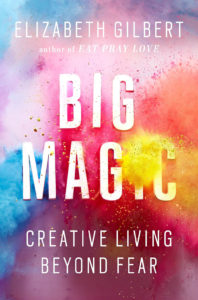 Thanks for joining us for this month’s virtual book club on Big Magic by Elizabeth Gilbert! It’s easy to participate: Just read the book, and then at your own convenience, add your thoughts to the comments section. You can respond to any of these discussion questions—or just share what you thought of the book.
Thanks for joining us for this month’s virtual book club on Big Magic by Elizabeth Gilbert! It’s easy to participate: Just read the book, and then at your own convenience, add your thoughts to the comments section. You can respond to any of these discussion questions—or just share what you thought of the book.
And as a bonus, I’ll give away a free book to one lucky commenter!
***
A friend recommended this book to me recently, after asking what my next creative endeavor would be. She lives a creative life, whether she’s making a meal, writing a clever email, or learning a new skill, so I was eager to heed her recommendation.
I found some of the ideas at the beginning of the book a little wonky (like the idea that the plotlines of books are just floating around in space, waiting to be received by a willing author—really?!). But the principles for living a creative life, regardless of what form that creativity takes, resonated with me.
Discussion #1: The Courage of Creating
For me, writing a book felt a lot like jumping off a high dive—terrifying and exhilarating at the same time. So the idea that creativity takes courage made a lot of sense to me. I liked the author’s perspective that “fear is boring.”
My fear always made predictably boring decisions, like a choose-your-own-ending book that always had the same ending: nothingness.
Why do you think creating something feels so scary? What creative tasks have you tackled in the face of your fears?
Discussion #2: The Curse of Perfectionism
As a recovering perfectionist, I know what it’s like to hear that voice whisper in your ear that if you can’t do it right, you might as well not do it at all. I’m thinking I should hang this advice from the author’s mom on my office wall or above the stove in my kitchen: “Done is better than good.”
A good-enough novel violently written now is better than a perfect novel meticulously written never.
Do you struggle with perfectionism? When is this a good trait, and when does it get in the way?
Discussion #3: The Role of Failure in Creativity
If there’s one fear that thwarts creativity more than anything else, I’d venture to say it’s the fear of failure. But failure is an essential part of the creative process. In the chapter “Do Something Else,” Elizabeth Gilbert poses the question, “How do you keep living a creative life after you’ve failed?”
First of all, forgive yourself. Remember that you’re nothing but a beginner—even if you’ve been working on your craft for fifty years. We are all just beginners here, and we shall all die beginners.
It’s encouraging to me that even a bestselling author considers herself a beginner; that creates space for the rest of us to be beginners too.
What new ventures are you afraid to try because you don’t want to fail? Does it help to know that we’re all beginners when it comes to creativity?
Discussion #4: Not Caring What Other People Think
In the chapter entitled “Nobody’s Thinking about You,” the author quotes her mentor as saying:
We all spend our twenties and thirties trying to be perfect, because we’re so worried about what people will think of us. Then we get into our forties and fifties, and we finally start to be free, because we decide that we don’t give a damn what anyone thinks of us. But you won’t be completely free until you reach your sixties and seventies, when you finally realize this liberating truth—nobody was ever thinking about you, anyhow.
Have you found it to be true that you care less about what other people think of you as you get older? Do we have to wait until we’re in our sixties and seventies to be free from the fear of what other people think?
Rating
I would give this book four stars out of five. I could have done without some of the wonky worldview, but I appreciated Gilbert’s insights and inspirations about living a creative life.
How many stars would you give this book? And what will your next creative endeavor be?
